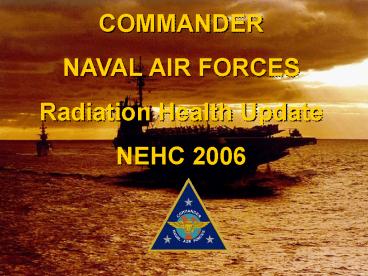RAM SMO Course - PowerPoint PPT Presentation
1 / 31
Title:
RAM SMO Course
Description:
Liaison officer (Naval Dosimetry Center, Specialty Leader, Naval Reactors, etc. ... Monthly CO's Dosimetry report. Situational and Annual Reports to BUMED ... – PowerPoint PPT presentation
Number of Views:182
Avg rating:3.0/5.0
Title: RAM SMO Course
1
COMMANDER NAVAL AIR FORCES Radiation Health
Update NEHC 2006
2
Overview
- Role of TYCOM RHO
- Rad Health Instruction, CNAF 6470.4
- Inspections, Assessments and Visits
- Common Inspection Deficiencies
- Dose Estimates/Investigations
- RHO vs MAO
- Radiation Health Tech Update
- RHO Turnover
- Future Issues
3
Role of TYCOM RHO
- Provide assistance at the TYCOM level to ensure
compliance of applicable instructions through
regular assistance, training and inspection - Provide technical assistance as needed regarding
dosimetry, physical exams, and any
incidents/accidents involving ionizing radiation - Consolidate input on issues facing the Fleet
- Liaison officer (Naval Dosimetry Center,
Specialty Leader, Naval Reactors, etc.).
4
CNAF Radiation Health Manual
- COMNAVAIRFOR INSTRUCTION 6470.4
- Revised in November 2004
- Ready reference for the function of a CVN
radiation health program afloat - Changes enforced as of April 05
5
COMNAVAIRFOR INSTRUCTION 6470.4
- Summary of Requirements
- Audit discrepancy corrective action reports must
include analysis of audit discrepancies to
include identification of root causes, corrective
actions and measures of effectiveness. - Monthly analysis of radiation exposure
information. Report exposure trends up the chain
of command via the COs monthly report.
Differentiate between yard, pre-deployment
work-up and deployment underway periods.
Establish criteria that would require further
investigation.
6
COMNAVAIRFOR INSTRUCTION 6470.4
- Summary of Requirements (Cont)
- Track and assess Dose Investigations (DI) by type
and frequency. Report DI trends up the chain of
command via the COs monthly report. Identify
DI criteria that would require further command
action. - CRA and RHO review all discrepancies and
corrective actions and forward a deficiency
tracking list to the Commanding Officer, via the
chain of command, on outstanding corrective
actions and measures of effectiveness for
Internal and External audits.
7
Inspections, Assessments and Visits
- Radiation Health Audits
- Internal and External
- Surface Nuclear Power Mobile Training Team
(SNPMTT) - Admin Audit
- Contaminated Injured Sailor
- Technical Assist Visit (TAV)
- By Request
- Operational Reactor Safeguards Exam (ORSE)
- Post-overhaul Reactor Safeguards Exam (PORSE)
8
Inspections, Assessments and Visits
- Health Record Review
- Physicals
- Exposure Records (zero deficiency program)
- Internal Monitoring Records
- Dosimetry Program
- TLD Reader Qualifications
- TLD Reader Worksheets
- Calibration Records
- LiF Program
9
Inspections, Assessments and Visits
- Administrative Review
- Monthly COs Dosimetry report
- Situational and Annual Reports to BUMED
- Annual Report to NAVSEA 08
- Dose Investigations and Estimates
- Internal Audit (scope and completeness)
- Corrective Actions (External Internal Audits)
- Visitor Statements and Dose Transmittals
10
Inspections, Assessments and Visits
- Training
- All Hands RADCON Training
- Emergency Medical Responders
- Reactor Compartment Tours
- Ship-wide Drills
- Rx Casualty Drills - Contaminated Injured Sailor
(CIS) - Praticals and Evolutions
- TLD Read
- Internal Monitoring
11
Common AuditDeficiencies
- Exposure Transcription Errors
- Dose Investigation / Estimate Methods and
Justifications / Complete documentation - Abnormal Lab Values not properly addressed by a
physician - Reports to BUMED submitted late and/or incomplete
- Failure to incorporate new CNAFINST 6470.4
requirements
12
Common Audit Deficiencies
- CONTAMINATED INJURED SAILOR (CIS) DRILLS
- Lack of First Aid provided by first responders to
CIS at the scene - Not performing a complete whole body frisk prior
to starting decontamination. - Not performing a frisk of the wound with and
without a beta shield to determine if
contamination is external or internal to the
wound.
13
Dose Investigations / Dose Estimates
- High Visibility Item with NAVAL REACTORS
- TYCOM Tracks and Reports to NAVSEA 08R
- Leading Causes Lost TLDs and Personnel Entering
Posted Areas without a TLD - Methods used to Reduce Numbers
- Decrease the number of badged personnel
- Impose more harsh punishment for lost TLDs (NJP /
Personal Financial Burden) - Increase signage and all hands awareness
14
Dose Investigation / Dose Estimate stats
15
COMPARISON
- RHO vs MAO
- How do we judge success?
- Inspection Results
- Customer Satisfaction
16
Inspection Trends
17
Inspection Trends
18
Inspection Trends
19
Inspection Trends
20
Inspection Trends
21
Inspection Trends
22
Inspection Trends
23
Inspection Trends
24
Inspection Trends
25
Inspection Trends
26
Customer Satisfaction
- Driven by inspection results
- Trends suggests that we have room for improvement.
27
Improvement Plan
- Standardize a SOP
- Standardize the MTT grading system
- Push improvements to SAMS
- Mentor junior RHOs
- Encourage communication
28
Radiation Health TechUpdate
- New Radiation Health Tech Specialty Leader
- HM1 Gaines, NUMI (860) 694-2876
- Training
- Mentorship Program Instituted
- Hands-on training
- Manning Issues
- More Sr. Techs Needed
29
RHO Turnover
- Large Carrier RHO Turnover Through Summer 2006
- TYCOM RHOs
- Pacific
- LCDR Lisa Kennemur, MSC, USN
- Atlantic
- LCDR Greg Kahles, MSC, USN
30
Future Issues
- Electronic Pocket Dosimeters (EPD) Implementation
- Phase out CaF DT-526 dosimeters and implement the
new LiF DT-702 (Shore facility target date Jun
06) - NAVMED P-5055 Revision
31
Questions ?
COMNAVAIRLANT Force RHO LCDR Greg Kahles, MSC,
USN (757) 444-0318 (DSN 564) Fax (757)
444-4720 email gregory.kahles_at_navy.mil
COMNAVAIRPAC Force RHO LCDR Lisa Kennemur, MSC,
USN (619) 545-3687 Fax (619) 767-7417 email
lisa.kennemur_at_navy.mil































